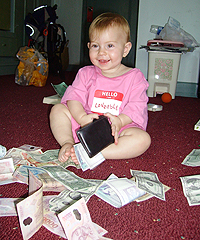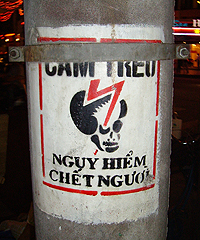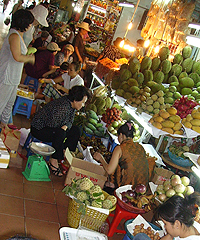|
|
First thing we noticed upon arriving in Ho Chi Minh City: No one calls it Ho Chi Minh City. It’s Saigon, no matter what the commies tried to change it to in 1976. (So there. The war wasn’t pointless after all.) The people in the city, many of whom fled the country during the communist takeover—then returned—refuse to give Uncle Ho the credit for their city. Besides, “Saigon” sounds bad-ass and Ho Chi Minh City sounds like a baby sneezing.
BLATANT OVERGENERALIZATION ALERT: Where we found Thais to be passive-aggressive and Cambodians to be quiet and sad, the Vietnamese we’ve met are gruff and straightforward. I gotta say, I like it. You instantly know where you stand with them. Usually because you’re standing in their way.
We were dazed by the sheer amount of papers we had to fill out and lines to get in before we could exit the airport. Hannah, it seems, preferred Cambodia, because she screamed and bawled and may have even bit one or both of us while we were in customs. But once she cooled off and the Vietnamese officials folks finally ascertained that we were not planning to get permanent jobs as rice paddy farmers, we took a cab downtown.
|
|
Immediately, we found ourselves surrounded by thousands of confrontational people on motorbikes honking and turning and driving in no discernible traffic pattern. The roads looked like a bowl of noodle salad.
A word about crossing the street in Saigon. You know that scene in the Indiana Jones movie where Harrison Ford is standing over the gaping canyon and has to take a step out into the abyss with seeing any kind of bridge, and only when he has faith does the bridge appear? Well, this is nothing like that, because you can’t even take the first step without getting hit by a kid on a Vespa. The only way to do it, as far as I can tell, is to walk without looking and let the action part around you like you’re Moses at the Red Sea. If you spend any time looking or waiting, you’ll be on that corner forever.
Our hotel, the Huong Sen, overlooks Dong Khoi Street, which is famous as the avenue where American GIs used to score prostitutes. Maybe I’m not looking hard enough, but all I see are ceramic shops. However, it’s not hard to envision hot soldier-on-hooker action in our room of the Huong Sen, because it looks like it’s stuck in 1967. It’s like one of those swinging sixties bachelor pads with the velvet and the round pillows and thick carpet. I wouldn’t have been surprised to find bras hanging from the ceiling fan.
|
|
We had dinner at a place our buddy Alan recommended. (Alan, it should be mentioned, claimed he was the only American soldier to enjoy the Vietnam War. “Are you kidding?” he told me. “I was a young guy carrying a gun around. The Vietnamese women went nuts.” It should also be mentioned that Alan was the one who told us about the Hookers-on-Dong-Khoi-street thing. His Vietnam experience involved less napalm than martinis.) Anyway, at dinner, Hannah accidentally ate an insanely hot chili—again—and then she wouldn’t take any rice we offered her to cool her tongue. She may never accept food we offer her again.
We met a creepy old man in a park along the Saigon River who knew two words of English: “OK” and “69.”
Then we went to a mall and bought all these bootleg DVDs for like 25,000 dong, which is about $1.40. One of them was Match Point, which we watched after Hannah fell asleep that night. It’s apparently a movie about Scarlett Johansson’s boobs. But when I say the movie was a bootleg, I really mean it. The camera keeps moving and you periodically hear people in the theatre coughing. At one point the person next to the guy illegally filming Scarlett Johansson’s boobs got up to go to the bathroom. I don’t even want to know what he did in there.





